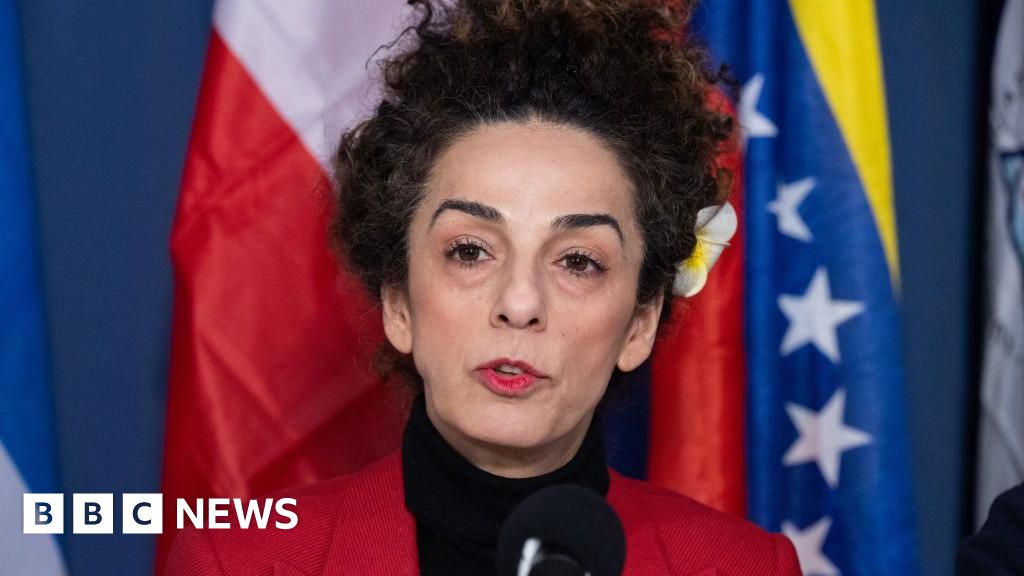Eastern European Organized Crime Leaders Convicted in Murder-for-Hire Plot Targeting U.S.-Based Journalist
Table of Contents
- 1. Eastern European Organized Crime Leaders Convicted in Murder-for-Hire Plot Targeting U.S.-Based Journalist
- 2. justice Delivered: Mobsters Found Guilty in Iranian-Backed Assassination Attempt
- 3. Masih Alinejad: A Voice for Freedom
- 4. Details of the Murder-for-Hire Scheme
- 5. Beyond the verdict: Implications and recent Developments
- 6. Practical applications and Lessons Learned
- 7. Addressing Potential Counterarguments
- 8. Amirov and Omarov Await Sentencing
- 9. How can the United States balance national security interests and international human rights in the face of increasing transnational repression?
- 10. Interview: Protecting Dissidents – Insights on the Murder-for-Hire Conspiracy and Transnational Repression
Published: March 21, 2025
justice Delivered: Mobsters Found Guilty in Iranian-Backed Assassination Attempt
In a landmark verdict delivered in New York, Rafat Amirov, 46, of Iran, and Polad omarov, 40, of Georgia, were convicted on multiple counts related to a chilling murder-for-hire scheme targeting Masih Alinejad, an iranian-American journalist residing in Brooklyn.The guilty verdict, reached after a two-week trial and just over three hours of jury deliberation, underscores the Justice Department’s commitment to protecting individuals within the U.S. from transnational repression.
The two men were found guilty on charges including murder-for-hire, conspiracy to commit murder-for-hire, and conspiracy to commit money laundering. These convictions carry meaningful penalties, potentially landing Amirov and Omarov behind bars for decades. The case highlights the increasing threat of foreign governments attempting to silence dissenters on American soil, a concern that resonates deeply within the U.S. intelligence and law enforcement communities.
The plot, prosecutors allege, was bankrolled by the Iranian government, which sought to silence Alinejad’s vocal criticism of its policies, especially the mandatory wearing of headscarves for Iranian women. This case is not isolated; it follows a pattern of alleged Iranian attempts to intimidate and silence Alinejad, raising serious questions about state-sponsored transnational repression.
Masih Alinejad: A Voice for Freedom
Masih Alinejad’s story is one of courage and resilience. A journalist and activist, she has been a prominent voice against the Iranian regime’s oppressive policies, particularly those targeting women. Her campaigns, often conducted through social media, have garnered significant attention and support, making her a target for those seeking to silence dissent.
Alinejad, who worked for Voice of America after leaving Iran in 2009, responded to the verdict with a mix of defiance and relief.”I have cried, I have laughed, I have even danced. As today is not just about my survival; it is indeed about the defeat and humiliation of a regime that believes it can silence its critics with bullets,” Alinejad said in a statement. She added, “They failed. I am still here. And I will keep fighting until every criminal in that regime faces their reckoning.”
Her case mirrors that of other dissidents who have found refuge in the U.S. only to face continued threats from their home countries. Experts argue that these instances highlight the need for increased vigilance and protection for those who speak out against authoritarian regimes.
Details of the Murder-for-Hire Scheme
The intricate plot unfolded over several months, involving surveillance, financial transactions, and coordination between individuals in multiple countries. Prosecutors detailed how the Iranian government, allegedly through intermediaries, funneled money to Amirov and Omarov to carry out the assassination. The scheme involved:
- Extensive surveillance of Alinejad’s home and activities in Brooklyn.
- Attempts to acquire firearms and other necessary equipment.
- The transfer of funds through a complex money laundering network designed to conceal the source of the payments.
The examination revealed the involvement of individuals with ties to Eastern European organized crime, adding another layer of complexity to the case. This highlights the intersection of transnational crime and state-sponsored repression, a growing concern for law enforcement agencies.
Beyond the verdict: Implications and recent Developments
The conviction of Amirov and Omarov is a significant victory, but it also raises broader questions about the U.S.’s ability to protect its residents from foreign threats. The case has prompted increased scrutiny of Iranian activities within the U.S. and renewed calls for stronger measures to counter transnational repression.
U.S. lawmakers have expressed concern over the Iranian government’s alleged involvement in plots targeting dissidents on American soil. Some have called for tougher sanctions and diplomatic measures to hold Iran accountable for its actions.This case underscores the ongoing tensions between the U.S. and Iran and the potential for these tensions to spill over onto American soil.
Furthermore, the involvement of Eastern European organized crime figures raises concerns about the vulnerability of the U.S. to transnational criminal networks. Law enforcement agencies are increasingly focused on disrupting these networks and preventing them from being used to carry out politically motivated attacks.
The Justice Department is likely to continue its investigation into the broader network of individuals involved in the plot, potentially leading to further arrests and indictments. This case serves as a warning to those who would seek to silence dissenters through violence and intimidation: the U.S. will not tolerate such actions.
Practical applications and Lessons Learned
this case offers several practical applications for law enforcement, policymakers, and individuals at risk of transnational repression.These include:
- enhanced security measures for individuals targeted by foreign governments.
- Increased intelligence sharing and collaboration between law enforcement agencies.
- Strengthened legal frameworks to prosecute those involved in transnational repression.
- Public awareness campaigns to educate individuals about the risks and how to protect themselves.
for individuals like Alinejad, the case underscores the importance of maintaining vigilance and taking appropriate security measures. It also highlights the need for continued advocacy and support for those who are targeted for their activism and journalism.
Addressing Potential Counterarguments
While the evidence presented in court strongly suggests Iranian government involvement, the Iranian government has consistently denied any connection to the plot, calling the allegations “ridiculous and baseless.” This denial is typical of governments accused of similar actions and is frequently enough accompanied by disinformation campaigns aimed at undermining the credibility of the allegations.
Some critics might argue that focusing on plots like this distracts from other crucial issues in U.S.-Iran relations. However, the U.S. government maintains that it is possible to address both national security concerns and human rights issues simultaneously.Protecting individuals from transnational repression is a basic principle and a key component of U.S. foreign policy.
Amirov and Omarov Await Sentencing
As of March 21, 2025, Amirov and Omarov await sentencing. The charges against them carry significant penalties, including potential life sentences. The judge will consider various factors in determining their sentences, including the severity of the crime, their role in the plot, and their criminal history.
The sentencing will be closely watched by human rights organizations and governments around the world, as it will send a strong message about the consequences of engaging in transnational repression.
How can the United States balance national security interests and international human rights in the face of increasing transnational repression?
Interview: Protecting Dissidents – Insights on the Murder-for-Hire Conspiracy and Transnational Repression
Archyde News Editor: Welcome, dr. Eleanor Vance, a leading expert in international security and a former advisor to the State Department. We’re hear today to discuss the recent convictions in New York related to the murder-for-hire plot targeting journalist Masih Alinejad. Dr. Vance, can you give us your initial reaction to the verdict?
Dr. Vance: Thank you for having me. The convictions of Rafat Amirov and Polad Omarov are a critically important victory in the fight against transnational repression. It sends a clear message that the U.S. will not tolerate foreign governments attempting to silence dissenters on American soil. This verdict, however, is just the tip of the iceberg. There is a significant amount of risk involved in high-profile cases like this.
Archyde News Editor: The article highlights the alleged involvement of the Iranian government. How common is it for foreign states to target dissidents in this manner?
Dr. Vance: Unluckily, it’s becoming increasingly common. We’ve seen a rise in what we call “transnational repression,” where governments try to silence critics beyond their borders. This includes surveillance, harassment, threats, and, in extreme cases, even assassination attempts. The use of intermediaries, like eastern European organized crime groups, adds a layer of deniability and complexity to these operations. The case reveals troubling implications for other individuals at risk across America.
Archyde News Editor: The plot involved intricate surveillance and financial transactions. What does this tell us about the sophistication of these operations?
Dr. Vance: It emphasizes that these are not amateur efforts. They involve planning, resources, and a network of individuals across multiple countries.The money laundering aspect is notably concerning, as it allows the perpetrators to conceal the origin of the funds and evade financial scrutiny. It also emphasizes the importance of enhanced security and intelligence sharing between law enforcement agencies.
Archyde News Editor: The verdict also raises questions about the U.S.’s ability to protect its residents from foreign threats. What more can be done?
Dr. Vance: Several things.Firstly, we need to enhance security measures for individuals at risk, including providing them wiht better protection and support. Secondly, increased intelligence sharing and collaboration between law enforcement agencies is essential. Thirdly, we should strengthen legal frameworks to prosecute those involved in transnational repression. we must launch public the public awareness campaign to educate individuals about the risks and how to protect themselves.
Archyde News Editor: The case also highlights the involvement of Eastern European organized crime figures. Does this point to a broader network of actors involved in such activities?
Dr.Vance: Absolutely. The intersection of transnational crime and state-sponsored repression is a growing area of concern.These criminal networks offer services. The investigation has likely revealed a broader network of individuals likely in this crime. Law enforcement agencies are increasingly focused on disrupting these networks.
Archyde news Editor: Dr. Vance, what do you think is the single most vital lesson learned from this case?
Dr. Vance: The conviction serves as a strong warning to those around the world who would seek to silence dissent through violence and intimidation. This should spark debate regarding balancing national security interests and international human rights. How can we create a more secure environment for those who face threats, while also safeguarding the principles of free speech and democracy? What do you think?
Archyde News Editor: Dr. Vance, thank you for your insightful analysis. It’s a critical time, and your perspective is invaluable.







